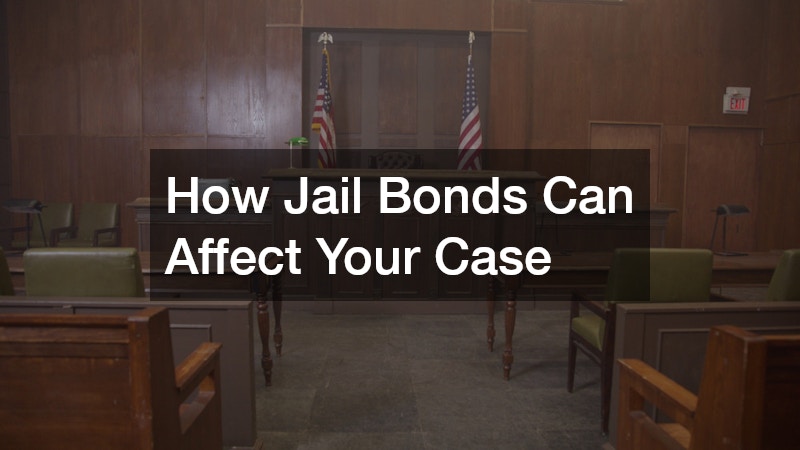How Jail Bonds Can Affect Your Case
Bail is a fundamental aspect of the criminal justice system that ensures a balance between the rights of the accused and the interests of public safety. In many cases, when someone is arrested, they may be granted the opportunity to secure their release from jail by posting bail. Jail bonds serve as a financial assurance that the accused will appear at their scheduled court hearings. Understanding the mechanics of jail bonds is crucial for defendants and their families.
The process of obtaining a jail bond can be complex, requiring a clear understanding of the types of bonds available, such as cash bonds or surety bonds. Each type has its implications, costs, and conditions that come into play during a legal proceeding. By exploring the nuances surrounding jail bonds, we can better appreciate their impact on both the accused and the overall legal process.
In the ensuing sections, we will delve deeper into how jail bonds operate, the ramifications of bail amounts, the options available for those who cannot afford bail, and the critical role of bail bondsmen in the framework of the justice system. This exploration aims to highlight the intricate relationship between jail bonds and legal outcomes, emphasizing the importance of informed decision-making.
What Are Jail Bonds and How Do They Work?
Jail bonds are financial instruments that allow a defendant to be released from custody while awaiting trial. They can take various forms, including cash bonds, where the defendant or their loved ones pay the full amount of bail in cash to the court. Alternatively, surety bonds involve a third-party bail bondsman who guarantees payment of the bail amount to the court if the defendant fails to appear. Understanding the specific type of bond that applies to a given situation is essential for navigating the criminal justice process.
When a bail amount is set by the court, the defendant or their representative must decide how to proceed based on their financial situation. The bail amount is generally determined by various factors, including the severity of the crime, the defendant’s criminal history, and the likelihood of fleeing. In many cases, defendants or their families opt for bondsmen to assist them in securing a release, especially when they lack liquid assets to post bail themselves.
How Can Bail Amount Affect Your Case?
The bail amount plays a significant role in a defendant’s ability to prepare a robust legal defense. A higher bail amount may restrict a defendant’s ability to secure their release, resulting in prolonged incarceration before their trial. This can lead to various detrimental effects, including limited access to legal counsel, an inability to gather evidence, and heightened stress levels. All these factors ultimately impede a defendant’s chances of mounting an effective defense.
Moreover, being incarcerated can impact a defendant’s personal and professional life, leading to job loss or strained family relationships. This indirect pressure can influence the defendant’s decision-making, potentially prompting them to accept plea deals that may not be in their best interest, simply to expedite their release. Therefore, understanding how bail amounts are calculated and the potential implications for one’s case is crucial.
What Happens If You Cannot Afford Bail?
For many defendants, particularly those from low-income backgrounds, the inability to afford bail can result in significant challenges. When bail amounts are prohibitive, the legal system provides a few options. Defendants may request a bail hearing to appeal for a lower bail, presenting arguments about their financial difficulties and community ties to convince the judge to reduce their bail. It’s essential for defendants to be aware of the nuances in this process and seek legal assistance.
Another option available to individuals who cannot afford bail is reaching out to family and friends for assistance or considering working with a bail bondsman. In most cases, bail bondsmen charge a non-refundable fee (often around 10% of the bail amount) for their services, allowing individuals access to funds without needing to pay the full bail themselves. Defendants must weigh their options carefully, particularly understanding the implications of involving a bondsman.
How Does the Use of a Bail Bondsman Work?
Bail bondsmen are licensed professionals who serve as intermediaries to help defendants secure their release from custody. When an individual cannot afford to pay their bail outright, they can turn to a bail bondsman to act on their behalf by posting the required bail with the court. The bondsman charges a fee for this service, which is typically a percentage of the total bail amount and is non-refundable.
When utilizing a bail bondsman, it’s crucial for defendants to understand their obligations. This includes complying with court orders, attending all scheduled court appearances, and maintaining communication with the bondsman. Failure to meet these obligations can lead to serious consequences, including the bondsman revoking the bond and the defendant being re-arrested. Understanding and managing these responsibilities is vital to ensure a smooth legal process.
Jail bonds play a crucial role in the criminal justice system, influencing a defendant’s capacity to prepare a defense and potentially affecting the outcome of their case. Understanding what jail bonds are, how bail amounts are determined, and what options exist for those unable to pay is essential for a fair legal process. The involvement of bail bondsmen also introduces distinct considerations that require careful navigation.






